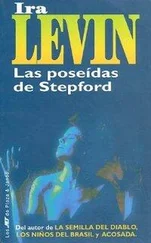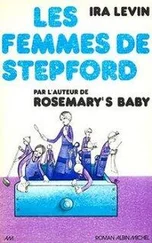“Thank you,” Rosemary said, and kissed Minnie’s cheek. “Thank you for everything.”
“You make Guy send us lots of pictures, you hear?” Minnie said, kissing Rosemary back.
“I will. I will,” Rosemary said.
Minnie turned to Guy. Roman took Rosemary’s hand. “I won’t wish you luck,” he said, “because you won’t need it. You’re going to have a happy, happy life.”
She kissed him. “Have a wonderful trip,” she said, “and come back safely.”
“Perhaps,” he said, smiling. “But I may stay on in Dubrovnik, or Pescara or maybe Mallorca. We shall see, we shall see . . .”
“Come back,” Rosemary said, and found herself meaning it. She kissed him again.
A taxi came. Guy and the doorman stowed the suitcases beside the driver. Minnie shouldered and grunted her way in, sweating under the arms of her white dress. Roman folded himself in beside her. “Kennedy Airport,” he said; “the TWA Building.”
There were more good-by’s and kisses through open windows, and then Rosemary and Guy stood waving at the taxi that sped away with hands ungloved and white-gloved waving from either side of it.
Rosemary felt less happy than she had expected.
That afternoon she looked for All Of Them Witches, to reread parts of it and perhaps find it foolish and laughable. The book was gone. It wasn’t atop the Kinsey Reports or anywhere else that she could see. She asked Guy and he told her he had put it in the garbage Thursday morning.
“I’m sorry, honey,” he said, “but I just didn’t want you reading any more of that stuff and upsetting yourself.”
She was surprised and annoyed. “Guy,” she said, “Hutch gave me that book. He left it to me.”
“I didn’t think about that part of it,” Guy said. “I just didn’t want you upsetting yourself. I’m sorry.”
“That’s a terrible thing to do.”
“I’m sorry. I wasn’t thinking about Hutch.”
“Even if he hadn’t given it to me, you don’t throw away another person’s books. If I want to read something, I want to read it.”
“I’m sorry,” he said.
It bothered her all day long. And she had forgotten something that she meant to ask him; that bothered her too.
She remembered it in the evening, while they were walking back from La Scala, a restaurant not far from the house. “How did you know Dr. Shand plays the recorder?” she said.
He didn’t understand.
“The other day,” she said, “when I read the book and we argued about it; you said that Dr. Shand just happened to play the recorder. How did you know?”
“Oh,” Guy said. “He told me. A long time ago. And I said we’d heard a flute or something through the wall once or twice, and he said that was him. How did you think I knew?”
“I didn’t think,” Rosemary said. “I just wondered, that’s all.”
She couldn’t sleep. She lay awake on her back and frowned at the ceiling. The baby inside her was sleeping fine, but she couldn’t; she felt unsettled and worried, without knowing what she was worried about.
Well the baby of course, and whether everything would go the way it should. She had cheated on her exercises lately. No more of that; solemn promise.
It was really Monday already, the thirteenth. Fifteen more days. Two weeks. Probably all women felt edgy and unsettled two weeks before. And couldn’t sleep from being sick and tired of sleeping on their backs! The first thing she was going to do after it was all over was sleep twenty-four solid hours on her stomach, hugging a pillow, with her face snuggled deep down into it.
She heard a sound in Minnie and Roman’s apartment, but it must have been from the floor above or the floor below. Sounds were masked and confused with the air conditioner going.
They were in Paris already. Lucky them. Some day she and Guy would go, with their three lovely children.
The baby woke up and began moving.
She bought cotton balls and cotton swabs and talcum powder and baby lotion; engaged a diaper service and rearranged the baby’s clothing in the bureau drawers. She ordered the announcements-Guy would phone in the name and date later-and addressed and stamped a boxful of small ivory envelopes. She read a book called Summerhill that presented a seemingly irrefutable case for permissive child-rearing, and discussed it at Sardi’s East with Elise and Joan, their treat.
She began to feel contractions; one one day, one the next, then none, then two.
A postcard came from Paris, with a picture of the Arc de Triomphe and a neatly written message: Thinking of you both. Lovely weather, excellent food. The flight over was perfect. Love, Minnie.
The baby dropped low inside her, ready to be born.
Early in the afternoon of Friday, June 24 th, at the stationery counter at Tiffany’s where she had gone for twenty-five more envelopes, Rosemary met Dominick Pozzo, who in the past had been Guy’s vocal coach. A short, swarthy, hump-backed man with a voice that was rasping and unpleasant, he seized Rosemary’s hand and congratulated her on her appearance and on Guy’s recent good fortune, for which he disavowed all credit. Rosemary told him of the play Guy was signing for and of the latest offer Warner Brothers had made. Dominick was delighted; now, he said, was when Guy could truly benefit from intensive coaching. He explained why, made Rosemary promise to have Guy call him, and, with final good wishes, turned toward the elevators. Rosemary caught his arm. “I never thanked you for the tickets to The Fantasticks, “ she said. “I just loved it. It’s going to go on and on forever, like that Agatha Christie play in London.”
“The Fantasticks?” Dominick said.
“You gave Guy a pair of tickets. Oh, long ago. In. the fall. I went with a friend. Guy had seen it already.”
“I never gave Guy tickets for The Fantasticks,” Dominick said.
“You did. Last fall.”
“No, my dear. I never gave anybody tickets to The Fantasticks; I never had any to give. You’re mistaken.”
“I’m sure he said he got them from you,” Rosemary said.
“Then he was mistaken,” Dominick said. “You’ll tell him to call me, yes?”
“Yes. Yes, I will.”
It was strange, Rosemary thought when she was waiting to cross Fifth Avenue. Guy had said that Dominick had given him the tickets, she was certain of it. She remembered wondering whether or not to send Dominick a thank-you note and deciding finally that it wasn’t necessary. She couldn’t be mistaken.
Walk, the light said, and she crossed the avenue.
But Guy couldn’t have been mistaken either. He didn’t get free tickets every day of the week; he must have remembered who gave them to him. Had he deliberately lied to her? Perhaps he hadn’t been given the tickets at all, but had found and kept them. No, there might have been a scene at the theater; he wouldn’t have exposed her to that.
She walked west on Fifty-seventh Street, walked very slowly with the bigness of the baby hanging before her and her back aching from withstanding its forward-pulling weight. The day was hot and humid; ninety-two already and still rising. She walked very slowly.
Had he wanted to get her out of the apartment that night for some reason? Had he gone down and bought the tickets himself? To be free to study the scene he was working on? But there wouldn’t have been any need for trickery if that had been the case; more than once in the old one-room apartment he had asked her to go out for a couple of hours and she had gone gladly. Most of the time, though, he wanted her to stay, to be his line-feeder, his audience.
Was it a girl? One of his old flames for whom a couple of hours hadn’t been enough, and whose perfume he had been washing off in the shower when she got home? No, it was tannis root not perfume that the apartment had smelled of that night; she had had to wrap the charm in foil because of it. And Guy had been far too energetic and amorous to have spent the earlier part of the night with someone else. He had made unusually violent love to her, she remembered; later, while he slept, she had heard the flute and the chanting at Minnie and Roman’s.
Читать дальше











